MRes student Sarah Clark features in episode five of the Student Minds podcast series, “Life as a Neurodivergent Student,” with her episode titled “Finding Balance as a Neurodivergent Student” launching today (12th November) on Spotify and Apple Podcasts.

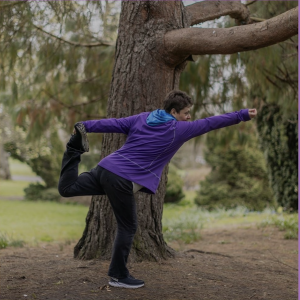
Listen here on Spotify: All Things Mental Health Podcast
The All Things Mental Health podcast shines a light on the experiences of young people and students, bridging the gap between research and lived experience to create space for open, authentic conversations about mental health and neurodivergence. Recently featured in The Guardian, the podcast now ranks in the top 15% of podcasts shared globally, with partners including the University of Oxford, King’s College London, Student Minds, SMaRteN, and U-Belong.
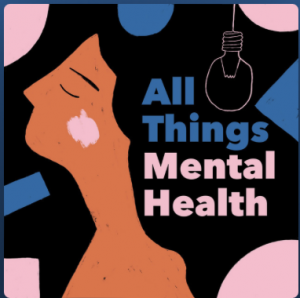
Supervised by Dr Emily Arden-Close (Bournemouth University) and Dr Jessica Eccles (Brighton and Sussex Medical School), Sarah’s MRes research explores how to reduce diagnostic delays for autistic individuals with Ehlers-Danlos syndrome (EDS) – a complex, multi-systemic connective tissue disorder that remains under-recognised and frequently misdiagnosed.
Sarah’s passion for this research stems from her own lived experience. She was diagnosed with hypermobile Ehlers-Danlos syndrome in 2020 after years of medical invalidation and misdiagnosis. During her MSc in Clinical and Developmental Neuropsychology at BU, a pivotal “lightbulb moment” during the autism lectures led her to realise that autism could explain many of her lifelong experiences – a possibility that had never before been considered. She was subsequently diagnosed as autistic in 2022, an experience that transformed both her own personal understanding and her academic trajectory.
In this podcast episode, Sarah and her peer co-host reflect on what it truly means to be a neurodivergent student — exploring how we define work-life balance, what meaningful support looks like, and how the invisible intersections between neurodivergence and physical health shape learning, wellbeing, and identity. Together, they share stories of diagnostic journeys, self-acceptance, and adapting to challenges while navigating academia with compassion and authenticity.
Sarah also discusses how she manages work–life balance as a lived-experience researcher, highlighting the importance of flexibility, self-awareness, and self-kindness in sustaining both academic success and wellbeing.
Through this open and heartfelt discussion, Sarah and her peer co-host aim to offer insight, validation, and hope to students, researchers, educators, and practitioners striving to better understand and support the neurodivergent experience in higher education.
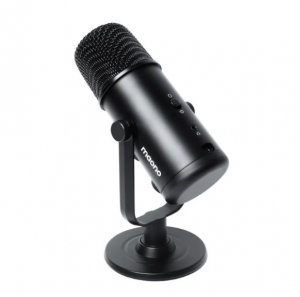
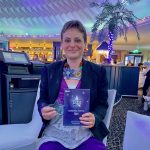 BU MSc Student, Sarah Clark, presents MSc dissertation research at BPS Division of Health Psychology Annual Conference 2024
BU MSc Student, Sarah Clark, presents MSc dissertation research at BPS Division of Health Psychology Annual Conference 2024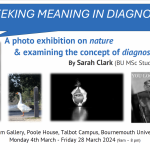 “Seeking meaning in diagnosis”: Exhibition by BU MSc Student Sarah Clark
“Seeking meaning in diagnosis”: Exhibition by BU MSc Student Sarah Clark










 Nursing Research REF Impact in Nepal
Nursing Research REF Impact in Nepal Fourth INRC Symposium: From Clinical Applications to Neuro-Inspired Computation
Fourth INRC Symposium: From Clinical Applications to Neuro-Inspired Computation ESRC Festival of Social Science 2025 – Reflecting back and looking ahead to 2026
ESRC Festival of Social Science 2025 – Reflecting back and looking ahead to 2026 3C Event: Research Culture, Community & Cookies – Tuesday 13 January 10-11am
3C Event: Research Culture, Community & Cookies – Tuesday 13 January 10-11am Dr. Chloe Casey on Sky News
Dr. Chloe Casey on Sky News ECR Funding Open Call: Research Culture & Community Grant – Application Deadline Friday 12 December
ECR Funding Open Call: Research Culture & Community Grant – Application Deadline Friday 12 December MSCA Postdoctoral Fellowships 2025 Call
MSCA Postdoctoral Fellowships 2025 Call ERC Advanced Grant 2025 Webinar
ERC Advanced Grant 2025 Webinar Horizon Europe Work Programme 2025 Published
Horizon Europe Work Programme 2025 Published Update on UKRO services
Update on UKRO services European research project exploring use of ‘virtual twins’ to better manage metabolic associated fatty liver disease
European research project exploring use of ‘virtual twins’ to better manage metabolic associated fatty liver disease